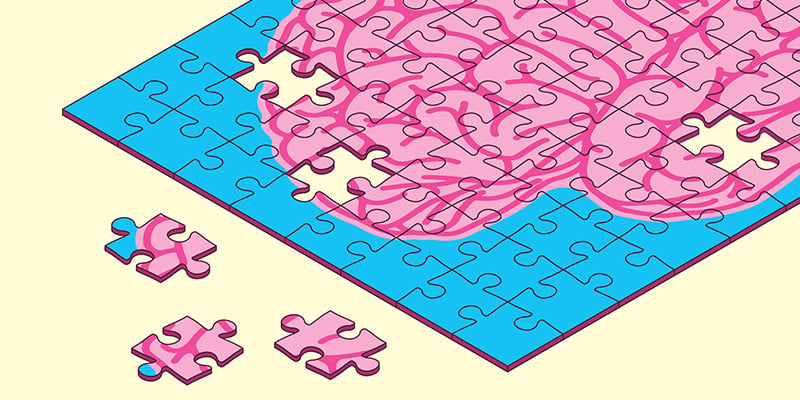
Is your memory worse than it used to be? An increasing problem with forgetfulness is the most common indicator of Alzheimer’s disease, but it isn’t the only one. There are many other warning signs that your mind is headed for trouble. Here are 11 early signs of Alzheimer’s disease that you need to know.
An increasing problem with forgetfulness is the most common indicator of Alzheimer’s disease, but it isn’t the only one.
11 Early Signs of Alzheimer’s Disease You Should Know
1. Memory loss.
The most common warning sign of Alzheimer’s disease is memory loss. Do you routinely forget people’s names? If you read an article or a chapter in a book, do you quickly forget what you just read? Do you repeatedly ask the same questions so often that your family gets annoyed with you? Are you lost without the reminders on your smartphone?
2. Problems with planning and problem-solving.
Do you find it more challenging to make plans and follow through with them? Do you fail to pay your bills on time or having trouble balancing your checkbook? Is it getting more difficult for you to follow directions or instructions, such as a recipe? These are warning signs that are associated with Alzheimer’s disease.
3. Poor judgment.
Have you started making bad decisions? Are you spending money you don’t have or making high-risk investments? Are you acting impulsively or behaving in ways you wouldn’t normally? Breaking the law, such as shoplifting, speeding, or trespassing, was the first sign of a type of dementia called frontotemporal dementia in 14% of people with this condition, according to research in JAMA Neurology.
4. Social withdrawal.
One of the early signs of Alzheimer’s is social isolation, according to a 2021 study. Social withdrawal may begin years prior to being diagnosed with Alzheimer’s disease. Are you spending more time alone or feeling less motivated to engage with family and friends?
5. Trouble with time.
Having difficulty keeping track of time or knowing the date or day of the week is another possible indicator of dementia. When it comes to time distortions related to Alzheimer’s, scientific findings point to deterioration in the brain’s hippocampus, which can begin years before symptoms emerge.
6. Getting lost.
Feeling disoriented is a common warning sign of Alzheimer’s disease. Do you find yourself wondering where you are or how you got there? Research shows that the brain regions involved in sense of location are damaged in the early stages of the disease.
7. Falling more frequently.
Are you falling or tripping more often? A brain imaging study in Neurology shows that adults who fall more frequently are at greater risk of developing early onset Alzheimer’s disease. In fact, the study also found that increased falls occurred earlier than memory and other cognitive symptoms of Alzheimer’s.
8. Gum disease.
Are your gums inflamed, or do they bleed easily when you brush your teeth? Mounting scientific research points to gum disease as a risk factor for Alzheimer’s disease and other forms of dementia. Experts suggest that gum disease is an indicator of inflammation, which is a known risk factor for Alzheimer’s.
9. Problems with sense of smell.
Do you have trouble identifying scents like pineapple, paint thinner, or soap? Losing your sense of smell (called anosmia) could be one of the earliest warning signs of Alzheimer’s. The region of the brain involved in sense of smell is one of the first to deteriorate in Alzheimer’s disease. Brain imaging research in the Journal of Alzheimer’s Disease shows that individuals with olfactory deficits have the same neurodegenerative changes seen in people with Alzheimer’s.
10. Depression.
Are you experiencing low moods? Depression can be an early indicator of Alzheimer’s disease. Scientific evidence shows that having major depressive disorder quadruples the risk of cognitive impairment in men and doubles it in women. Research from Brazil shows that depression has a significant impact on the age of onset for Alzheimer’s disease.
11. Other mental health problems.
Are you struggling with ADD/ADHD, bipolar disorder, or other mental health issues? A wealth of research shows that psychiatric disorders increase the risk of memory problems. For example, findings from a 2019 study show that adults with ADD/ADHD are at more than 3 times the risk of developing dementia, and a 2017 study shows that bipolar disorder significantly increases the risk in older adults. Other conditions that elevate the risk for cognitive decline include posttraumatic stress disorder (PTSD), chronic stress, and schizophrenia.
ALZHEIMER’S DISEASE AND THE BRAIN
Amen Clinics, the global leader in brain health, has worked with thousands of people who are worried about memory problems as well as others who don’t recognize that their symptoms may be early signs of Alzheimer’s disease. Brain SPECT imaging, which measures blood flow and activity in the brain, can help detect brain changes associated with Alzheimer’s disease years or even decades before symptoms arise.
Early detection on brain scans gives people the opportunity to get treatment in the early stages when it is most effective. Seeing the signs associated with Alzheimer’s disease on brain scans can also motivate you to make lifestyle changes that improve brain health and help protect memory.
Neuroimaging can also be helpful in determining if memory loss and other symptoms may be due to other treatable causes, such as head trauma, exposure to toxins, neurohormone issues, infections like COVID-19 or Lyme disease, substance use, and more. Treating these issues can have a powerfully positive effect on memory and cognitive function.
Memory problems, depression, ADD/ADHD, and other mental health issues can’t wait. At Amen Clinics, we’re here for you. We offer in-clinic brain scanning and appointments, as well as mental telehealth, clinical evaluations, and therapy for adults, teens, children, and couples. Find out more by speaking to a specialist today at 888-288-9834 or visit our contact page here.





Thank you for such an informative article. As my parents and in laws are in their mid 80's, it is helpful to keep these warning signs in the back of my mind
Comment by David Ocasio — August 26, 2022 @ 5:18 AM
I appreciate this article on Alzheimer’s. My husband passed away May 2021 with this ailment and it was all very sad…the last six months were an absolute nightmare….and perhaps if we had known some of the early signs things could have been different. I am now in my 90th year….and I am grateful for this article so that I can be observant for any of the signs outlined….that wouldn’t be just an indication of ‘old age’!! Thank you!
Comment by Bev Thomson — August 26, 2022 @ 7:07 AM
Thank you for all the information you have sent to me since I joined with the Amen Clinics (through PBS). A family member was recently diagnosed with mild cognitive decline this year and there is Alz. in the immediate family. So I find all the articles/books/CDs very helpful.
Comment by Julia G. Garnant — August 26, 2022 @ 9:03 AM
Love your articles. I wish that some type of price list and/or info on what services might be covered by medical insurance would be helpful. Depression and ADHD and anxiety run in my family. I would love to see more studies on whether or not it is possible that the drug treatments for these contribute to mental decline or it it really is the condition itself.
Comment by Laura — August 30, 2022 @ 4:07 PM
I have concerns for myself. Runs in the family. I would love knowing what services may be covered by insurance ,
Comment by Leslie Ziemkowski — November 19, 2022 @ 8:57 AM